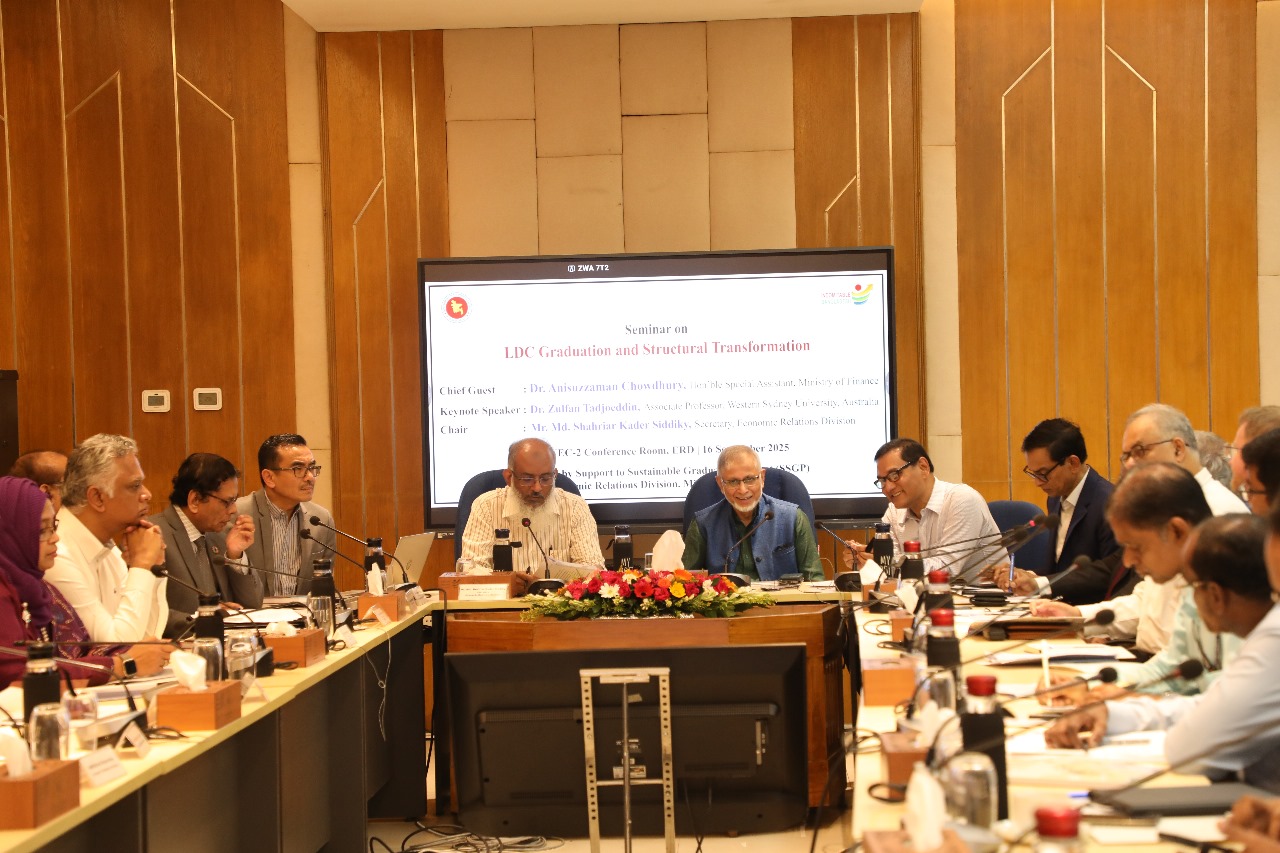News Flash
News Flash

DHAKA, Sept 16, 2025 (BSS) - LDC-specific international support measures (ISMs) may get squeezed in the coming days in light of the changing global economic scenario, said Dr Anisuzzaman Chowdhury, Special Assistant to the Chief Adviser.
Against this backdrop, he has called for reducing the country's dependence on LDC-specific ISMs.
The Special Assistant made this remark while speaking as the chief guest of a seminar on 'LDC Graduation and Structural Transformation' held at the NEC 2 Conference Room in the capital today.
Support to Sustainable Graduation Project (SSGP) of the Economic Relations Division (ERD) organized the seminar which was chaired by the Secretary of ERD Md. Shahriar Kader Siddiky, said a press release.
Dr. Anisuzzaman Chowdhury, in his speech, cautioned whether the country remains an LDC or not, it would be difficult to continue to receive ISMs in the coming years due to the contraction of the global economy.
In this context, he put emphasis on taking necessary preparations so that the country can maintain its competitive edge even in the absence of such ISMs.
The Special Assistant also asked the private sector to raise the wages of industrial workers while providing them with adequate training facilities to increase their productivity.
Dr. Chowdhury also put emphasis on exploring cheap and eco-friendly energy resources. Using such eco-friendly energy can help the export-oriented industries to become globally complaint, he pointed out.
ERD Secretary Md. Shahriar Kader Siddiky, in his remarks, said that to accelerate structural transformation, the role of the international community, including governments, development institutions and private sector actors is crucial in supporting LDCs through providing technical assistance, financial support, trade facilitation and access to global markets.
He also pointed out that Bangladesh's Smooth Transition Strategy (STS) has already provided a roadmap for coordinated action, which should now be translated into action.
Associate Professor of the Western Sydney University of Australia Dr. Zulfan Tadjoeddin delivered the keynote presentation at the event.
Dr. Tadjoeddin, in his keynote presentation, identified geo-politics and trust deficits as well as democratic deficits as major barriers to South and Southeast Asian LDCs' structural transformation.
Against this backdrop, he put emphasis on economic and social reforms to tackle low productive capacity. He also called for empowering citizens, enabling the state as well as navigating the geopolitical issues.
Additional Secretary of ERD and Project Director of SSGP A. H. M. Jahangir delivered the welcome address.
Secretary to the government and Project Adviser of SSGP Mr. Abdul Baki, Distinguished Fellow of the Centre for Policy Dialogue (CPD) Professor Mustafizur Rahman and the Research Director of Bangladesh Institute of Development Studies (BIDS) Dr. Kazi Iqbal spoke during as panelists.
The panel discussants, in their remarks, said that Bangladesh should move forward to graduate from LDC status in a timely manner while taking necessary policy measures for ensuring necessary structural transformation.
Chairman of Bangladesh Trade and Tariff Commission Dr. Moinul Khan, President of Bangladesh Garment Manufacturers and Exporters Association (BGMEA) Mahmud Hasan Khan, President of Leathergoods and Footwear Manufacturers & Exporters Association of Bangladesh (LFMEAB) Syed Nasim Manzur spoke, among others, at the event.
Private sector leaders, in their remarks, called for deferring Bangladesh's LDC graduation by three more years to ensure adequate readiness for facing the LDC graduation challenges. Against this backdrop, they also put emphasis on ensuring energy security and providing infrastructural support.
Many of the business challenges could be overcome by ensuring energy security, said President of BGMEA Mahmud Hasan Khan.
It is notable that Bangladesh is scheduled to graduate from LDC status on 24 November 2026. Structural transformation, which includes, among other shifting resources from low-productivity to higher-productivity sectors, improving technological capabilities, and diversifying the economy, is critical to ensure that graduation is sustainable and inclusive.
In this context, the seminar was organized to discuss the strategies, policy options, and collaborative actions needed to effectively harness structural transformation in the context of LDC graduation.
Senior officials from government ministries, agencies and research institutions, representatives from relevant trade associations and think tanks attended the event.